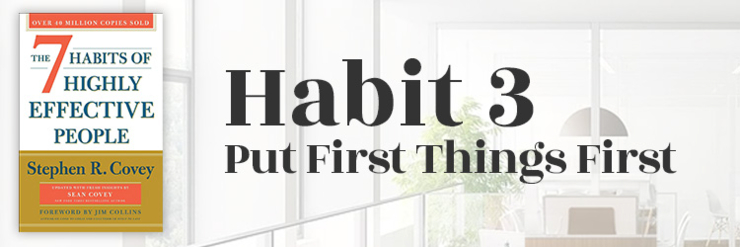The 7 Habits of Highly Effective People | Habit 3: Put First Things First

How to Lead with Vision
Leaders constantly balance priorities. Depending on the moment, they may focus on communication strategies, empowering employees, or engaging stakeholders. Sometimes, it's all three. As most leaders know, it’s easy to get swept up in tasks that don't move the needle toward long-term goals.
Enter Stephen Covey's third habit in The 7 Habits of Highly Effective People, "Put First Things First." This habit teaches leaders how to prioritize their most important tasks over the seemingly urgent ones. It shifts the focus from managing time to managing priorities, so you're always working toward your goals with intention and focus.
What Does "Put First Things First" Look Like?
Covey's Habit 3 is about time management, specifically learning to prioritize what's important over what's urgent. It builds on the foundation set by Habit 2, "Begin with the End in Mind." Once you've established your vision and goals, Habit 3 challenges you to make sure your daily actions align with those long-term objectives.
It's here that Covey introduces the Time Management Matrix, which categorizes tasks into four quadrants
Quadrant 1
Urgent and Important
(crisis situations, deadlines)
Quadrant 2
Not Urgent but Important
(long-term plans, relationship-building)
Quadrant 3
Urgent but Not Important (interruptions, non-essential tasks)
Quadrant 4
Not Urgent and Not Important (distractions, time-wasting activities)
To achieve success, Covey stresses that we should spend most of our time in Quadrant 2, where long-term success is built through planning, relationship nurturing, and strategy development. Many leaders fall into the trap of spending too much time in Quadrant 1 or 3, reacting to immediate needs or distractions instead of proactively working on important but not urgent tasks.
Frances Parker on Prioritizing What Matters Most
Frances Parker, Executive Agenda Group Chair, has successfully applied Habit 3 to her leadership style. By intentionally focusing on Quadrant 2 activities, she has been able to grow her business, strengthen relationships, and focus on what truly drives long-term success
"Before learning to "Put First Things First," I found myself constantly pulled into urgent tasks that felt important at the time but weren't aligned with my larger vision for the business," Parker explains. "Covey's framework helped me identify the difference between urgency and importance, and that shift has been pivotal for me. Now, I schedule time for Quadrant 2 activities, such as strategic planning and developing my leadership team. I've seen remarkable improvements in my business growth and personal effectiveness.
– Frances Parker, Executive Agenda Group Chair
How to Implement Habit 3 for Business Success
- Prioritize Planning Over Reaction
Rather than reacting to every immediate request or crisis, discipline yourself to focus on weekly long-term planning sessions that reinforce your actions and decisions that are aligned with your overall business goals. This planning time also allows you to anticipate challenges rather than react when they become urgent
-
Delegate Urgent but Non-Essential Tasks
Instead of getting bogged down in immediate but non-essential tasks, delegate the team to handle them. This frees up your time and develops your team's problem-solving skills, creating a more capable organization.
-
Schedule Time for Relationship Building
Leaders should schedule regular check-ins with their team, clients, and partners to build and nurture these relationships. By prioritizing this, leaders can build a network of trust and collaboration, significantly contributing to their business' success.
-
Practice Self-Care and Personal Growth
Recognizing that taking care of yourself—mentally, emotionally, and physically—is essential to being a strong leader. Carving out time for reflection, professional development, and well-being ensures that you can show up as the best version of yourself for your team and business.
How "Put First Things First" Creates Sustainable Leadership
Covey's Habit 3 is more than just a time management tool—it's a mindset shift. Leaders who consistently "Put First Things First" make decisions from a place of clarity and purpose rather than reaction or pressure. By focusing on the things that matter most, leaders know that their actions align with their values, goals, and vision for the future.
Looking Ahead: Think Win-Win
Now that we've highlighted Habit 3, it's time to dig into Habit 4, "Think Win-Win." This habit involves finding solutions where all parties feel they've gained something. Keep an eye out for our next blog post!
As an Executive Agenda member, you'll benefit from the experience of other leaders. You'll have a Group Chair/Executive Mentor and peer advisory group available to you around the clock.
Contact us or call 262-821-3600 to learn more
Take the Next Step in Your Executive Development
Learn about Why to Join EA and start overcoming your leadership obstacles with other friendly executives.
Share this article
